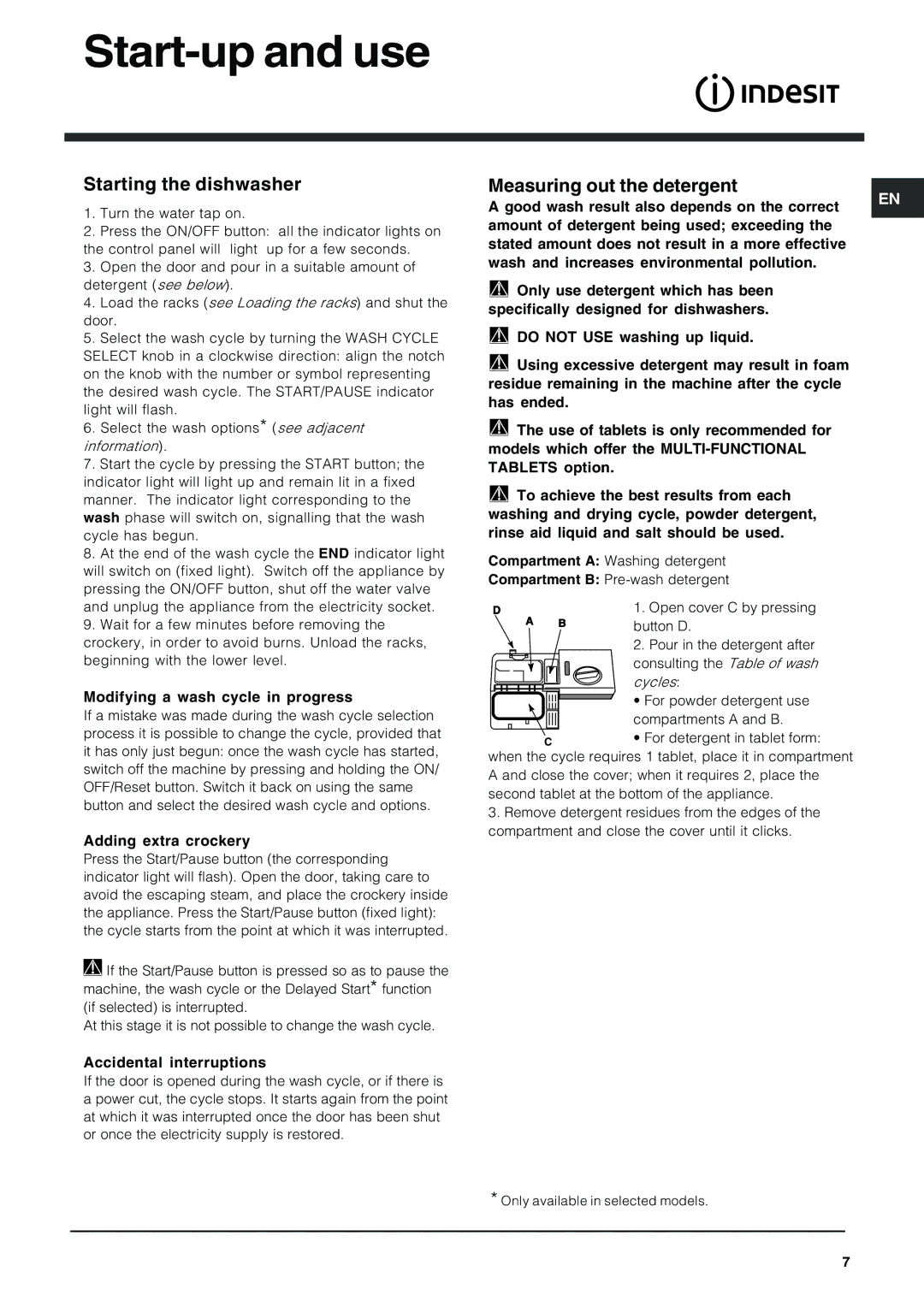
Start-up and use
Starting the dishwasher
1.Turn the water tap on.
2.Press the ON/OFF button: all the indicator lights on the control panel will light up for a few seconds.
3.Open the door and pour in a suitable amount of detergent (see below).
4.Load the racks (see Loading the racks) and shut the door.
5.Select the wash cycle by turning the WASH CYCLE SELECT knob in a clockwise direction: align the notch on the knob with the number or symbol representing the desired wash cycle. The START/PAUSE indicator light will flash.
6.Select the wash options* (see adjacent
information).
7.Start the cycle by pressing the START button; the indicator light will light up and remain lit in a fixed manner. The indicator light corresponding to the wash phase will switch on, signalling that the wash cycle has begun.
8.At the end of the wash cycle the END indicator light will switch on (fixed light). Switch off the appliance by pressing the ON/OFF button, shut off the water valve and unplug the appliance from the electricity socket.
9.Wait for a few minutes before removing the crockery, in order to avoid burns. Unload the racks, beginning with the lower level.
Modifying a wash cycle in progress
If a mistake was made during the wash cycle selection process it is possible to change the cycle, provided that it has only just begun: once the wash cycle has started, switch off the machine by pressing and holding the ON/ OFF/Reset button. Switch it back on using the same button and select the desired wash cycle and options.
Adding extra crockery
Press the Start/Pause button (the corresponding indicator light will flash). Open the door, taking care to avoid the escaping steam, and place the crockery inside the appliance. Press the Start/Pause button (fixed light): the cycle starts from the point at which it was interrupted.
![]() If the Start/Pause button is pressed so as to pause the machine, the wash cycle or the Delayed Start* function (if selected) is interrupted.
If the Start/Pause button is pressed so as to pause the machine, the wash cycle or the Delayed Start* function (if selected) is interrupted.
At this stage it is not possible to change the wash cycle.
Accidental interruptions
If the door is opened during the wash cycle, or if there is a power cut, the cycle stops. It starts again from the point at which it was interrupted once the door has been shut or once the electricity supply is restored.
Measuring out the detergent
A good wash result also depends on the correct | EN | |
| ||
amount of detergent being used; exceeding the |
| |
stated amount does not result in a more effective |
| |
wash and increases environmental pollution. |
| |
| Only use detergent which has been |
|
|
| |
specifically designed for dishwashers. |
| |
| DO NOT USE washing up liquid. |
|
|
| |
| Using excessive detergent may result in foam |
|
|
| |
residue remaining in the machine after the cycle |
| |
has ended. |
| |
| The use of tablets is only recommended for |
|
|
| |
models which offer the |
| |
TABLETS option. |
| |
| To achieve the best results from each |
|
|
| |
washing and drying cycle, powder detergent, |
| |
rinse aid liquid and salt should be used. |
| |
Compartment A: Washing detergent
Compartment B:
D |
| 1. Open cover C by pressing |
A | B | button D. |
|
| |
|
| 2. Pour in the detergent after |
|
| consulting the Table of wash |
|
| cycles: |
|
| • For powder detergent use |
|
| compartments A and B. |
C• For detergent in tablet form:
when the cycle requires 1 tablet, place it in compartment A and close the cover; when it requires 2, place the second tablet at the bottom of the appliance.
3.Remove detergent residues from the edges of the compartment and close the cover until it clicks.
*Only available in selected models.
7
